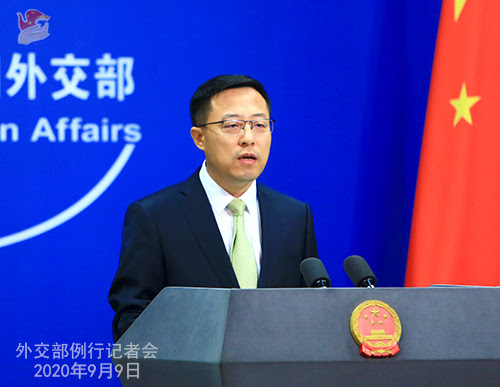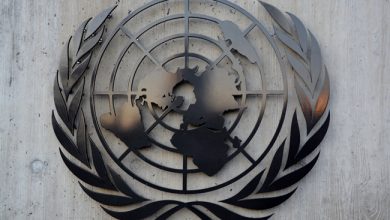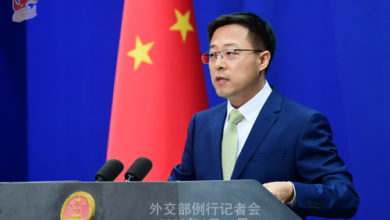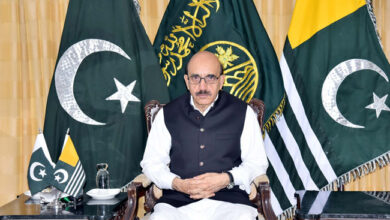The Chinese government provides a wide variety of opportunities for foreign press

At the invitation of Russian Foreign Minister Lavrov, Kazakh Foreign Minister Tileuberdi, Kyrgyz Foreign Minister Aidarbekov and Mongolian Foreign Minister Enkhtaivan, State Councilor and Foreign Minister Wang Yi will attend the meeting of the Shanghai Cooperation Organization Council of Foreign Ministers in Russia from September 10 to 16 and pay visits to Russia, Kazakhstan, Kyrgyzstan and Mongolia.
China Daily: US State Department spokesperson Morgan Ortagus tweeted on September 8 that “the State Department has been working for years to convince the PRC to allow US journalists back into China, to give US media outlets the freedom to resume their normal operations, and to stop the intimidation and harassment of foreign journalists”. She alleged that China is “suffering a dearth of open and independent media reporting” and cited a report by the Foreign Correspondents Club of China as proof. Do you have a response?
Zhao Lijian: The US official’s fabricated criticism of China is a perfect example of the guilty party blaming the victim by distorting facts. The issues she accused China of are non-existent. Except for the American media’s journalists who left as China was compelled to take countermeasures, can you name one China-based US media whose freedom of normal operation has been affected? Can you name one American journalist whose return to China has been hindered?
The merits of what happened in the media sector between China and the US is very clear. It was always the US that wantonly targeted Chinese media first, and China was compelled to take legitimate countermeasures. US officials should be honest with the facts. The US side has been escalating suppression of Chinese media, from registering as “foreign agents” to designating “foreign missions”, from indefinitely delaying without cause and even denying visa to more than 20 Chinese journalists to expelling in all but name more than 60, from shortening their stay to a maximum of 90 days through visa restriction to attempting to exploit their hostage-like situation to ramp up pressure on China. All these have put a heavy strain on Chinese journalists’ work and life in the US and seriously disrupted normal people-to-people exchange between the two countries.
The reporting environment in China is open and free. International journalists’ right to conduct reporting is fully protected by law. The Chinese government provides a wide variety of opportunities for foreign press. For major domestic events like the two sessions and international events like the G20 Summit or visits by foreign leaders, the Chinese side always facilitates foreign media’s coverage by setting up press centers and organizing interviews. If they are under constant intimidation and harassment as the US alleged, then how can you explain the large number of foreign media organizations and journalists in China? If there is no open and independent media reporting in China, then how come the foreign media here have produced such a rich variety of reporting?
As to the organization the US official mentioned, China has never recognized it. It was patched up by a few reporters who are biased against China and can by no means represent the true voice of the near 500 international journalists in China. This so-called organization has long been misrepresenting facts and vilifying China’s reporting environment. Where was its voice when the US denied visa to and in effect expelled Chinese journalists? Has it spoken a single word of justice when the US arbitrarily reduced Chinese journalists’ visa validity period and has yet to grant any one of them an extension?
The usual practice of certain American politicians and officials can be best summarized as claiming the moral high ground while trying to keep others down. But lies will never become facts and disguise will eventually be torn off. On one hand, the US keeps chanting “freedom of the press” and “independent reporting”; on the other, it brazenly meddles with reporting on the US, even assaulting journalists. The US Press Freedom Tracker documented 405 incidents violating press freedom in 64 American cities between May 26 and June 10, including 58 arrests and 86 assaults. For those American politicians and officials, “freedom of the press” is merely a pretext to smear and muffle reporters. This has laid bare their stark double standards and hegemonic bullying nature.
I want to stress once again that China remains committed to the basic state policy of opening-up. We welcome international media to conduct reporting within the framework of laws and regulations in China and will continue to offer them convenience and assistance. What we oppose is ideological bias towards China, fake news in the name of press freedom, and violation of professional ethics.
Phoneix TV: On State Councilor and Foreign Minister Wang Yi’s visit that you just announced, can you brief us on China’s expectations for the trip and relevant arrangements?
Zhao Lijian: State Councilor and Foreign Minister Wang Yi’s visit is an important diplomatic mission that combines both bilateral and multilateral dimensions and covers four friendly neighbors with a view to promoting SCO cooperation and deepening friendly and cooperative relations with the four countries.
As Russia holds the rotating SCO presidency from 2019 to 2020, China offers its full support for its work. During the upcoming meeting, State Councilor and Foreign Minister Wang Yi will exchange views with his counterparts of other SCO member states on SCO cooperation in various fields and major international and regional issues in the context of the COVID-19 pandemic. State Councilor and Foreign Minister Wang Yi will also hold bilateral meetings with foreign ministers of relevant member states and attend the Russia-India-China foreign ministers’ luncheon.
China and Russia are each other’ s largest neighbor and comprehensive strategic partner of coordination. This year, the two heads of state have maintained close exchange through telephone calls, letters and other means, guiding the high-level development of the China-Russia comprehensive strategic partnership of coordination in the new era. During his visit to Russia, State Councilor and Foreign Minister Wang Yi will hold talks and jointly meet the press with Foreign Minister Lavrov. The two ministers will compare notes on bilateral relations and international and regional issues of common concern to strengthen China-Russia strategic coordination.
Kazakhstan, Kyrgyzstan and Mongolia are all important neighbors. China and Kazakhstan are permanent comprehensive strategic partners, and China, Kyrgyzstan and Mongolia are comprehensive strategic partners. During his visit, State Councilor and Foreign Minister Wang Yi will meet with leaders of the three countries and hold talks with their foreign ministers to consolidate the traditional friendship, strengthen cooperation in fighting COVID-19, deepen practical cooperation in various fields, promote the high-quality development of BRI cooperation, and enhance coordination and cooperation in international affairs.
Global Times: According to reports, Australian intelligence agency staff raided the homes of four journalists working for three Chinese media organizations in June, seizing their computers and mobile phones. Can you confirm that? Do you have any comment?
Zhao Lijian: As we learn from relevant news agencies, in late June this year, Australian security and intelligence staff raided, searched and questioned four Australia-based journalists working for the Xinhua News Agency, China Media Group and China News Service on the ground of possible violation of foreign interference laws, seizing their working computers and mobile phones, and even educational tablets and electronic toys for children. As we understand, the Australian side has not yet provided reasonable explanation for searching these journalists or returned all seized items.
I would like to stress that Chinese media journalists in Australia strictly abide by local laws and regulations, adhere to the principle of objectivity and fairness in their reporting, and have done a lot of work to promote mutual understanding and friendly exchanges between the two peoples, which has been widely praised. The behavior of the Australian government seriously disrupts the normal reporting activities of Chinese media in Australia, grossly violates their legitimate rights and interests, and causes serious damage to the physical and mental health of the journalists and their families. This fully exposes the hypocrisy of ‘freedom of the press” and “respect and protection of human rights” as chanted by some in Australia and such act is by no means constructive. China has lodged solemn representations to the Australian side on multiple occasions. We urge the Australian side to immediately stop its barbaric and unreasonable acts, stop harassing and oppressing Chinese nationals in Australia under any pretext, ensure the safety and legitimate rights and interests of Chinese citizens, and stop doing anything that obstructs people-to-people exchanges and cooperation between the two countries.
Prasar Bharati: Both Indian and Chinese foreign ministers will be in Moscow for the SCO meeting. My question is, will they meet bilaterally on the sidelines? And if this bilateral meeting takes place, what are China‘s expectations?
Zhao Lijian: I have just told you the information on State Councilor and Foreign Minister Wang Yi’s trip. If we have anything to offer on the bilateral meeting you asked about, we will release it in a timely manner.
Reuters: About these four Chinese journalists, are they still in Australia or have they returned to China?
Zhao Lijian: As far as I know, they have returned to China.
RIA Novosti: I just want to confirm if you said in your press release that there will a luncheon between the three foreign ministers of China, Russia and India during State Councilor and Foreign Minister Wang Yi’s attendance at the SCO meetings? On which day exactly will he visit Russia?
Zhao Lijian: Yes. The three foreign ministers will have a luncheon meeting.
As I said, State Councilor and Foreign Minister Wang Yi will attend the meeting of the Shanghai Cooperation Organization Council of Foreign Ministers in Russia from September 10 to 16 and pay visits to Russia, Kazakhstan, Kyrgyzstan and Mongolia. More about this will be released in due course.
Reuters: Chinese media swiftly revealed this new information a day after the Australian journalists evacuated to Australia after being questioned by Chinese authorities. Is there a link between the two events? Is the arrest of Cheng Lei and subsequent questioning of the Australian journalists a consequence of the Australian investigation on these Chinese journalists?
Zhao Lijian: Today I talked about the situation relating to the Chinese journalists and yesterday you asked about the situation of the Australian journalists. These are two matters of different nature. These is no need to read too much into them.
Kyodo News: State Councilor and Foreign Minister Wang Yi is about to kick off a foreign trip, as you just announced. But the ongoing foreign ministers’ meetings on East Asia cooperation will not end till September 12. So, who will participate in the foreign ministers’ meetings on East Asia cooperation in lieu?
Zhao Lijian: We have already released relevant information. The Foreign Ministers’ meetings on East Asia cooperation will be held via video link from September 9 to 12. State Councilor and Foreign Minister Wang Yi will attend relevant meetings on September 9. Relevant information on the attendance of the Chinese side will be released in due course.
Reuters: US Customs and Border Protection officials have prepared orders to block imports of cotton and tomato products from China’s Xinjiang region over allegations they are produced with forced labor. What’s the ministry’s response to this latest action?
Zhao Lijian: Lately China has shown with facts and numbers that issues relating to Xinjiang are by no means about human rights, ethnicity or religion, but about counter-terrorism and anti-separatism. Xinjiang affairs are purely China’s internal affairs where the US has no right and is in no position to meddle.
What the US truly cares about is never human rights. It is just using human rights as a cover to suppress Chinese companies, undermine stability in Xinjiang and vilify China’s Xinjiang policy. The 1.4 billion Chinese people including all ethnic groups in Xinjiang have seen through the hypocrisy and malicious intentions of the US, as has the entire international community.
We urge the US to stop the wrong practice of interfering in China’s internal affairs and harming Chinese interests. China will continue taking all necessary measures to defend Chinese businesses’ lawful rights and interests.
South China Morning Post: Editor in Chief Hu Xijin of the Global Times tweeted on his account that China will sanction senior US officials that visit Taiwan and related US companies. Can you confirm that?
Zhao Lijian: Usually we make no specific responses to media reports and comments.
I can tell you that the Taiwan issue bears on the core interests of China. China’s position on this issue is consistent and clear. No one shall underestimate the steadfast determination and resolve of the Chinese government and people in safeguarding national interests. We urge the US to adhere to the one China principle and the three joint communiques between the two sides, stop any form of official exchanges with Taiwan, and cautiously and properly handle the Taiwan issue so as to avoid any serious damage to China-US relations and peace and stability across the Taiwan Straits.
Reuters: I wanted to ask about two separate letters submitted today by human rights advocacy groups. The first is a letter by human rights advocacy groups to the chief of the International Olympic Committee, calling for them to reconsider their choice to award Beijing the 2022 Winter Olympic Games in light of China’s rights record. And then, separately, some civil society organizations penned an open letter to the UN Secretary-General and the UN High Commissioner of Human Rights, calling for the creation of an international mechanism to address the Chinese government’s human rights violations. What’s the ministry’s comment on these?
Zhao Lijian: On your first question, some so-called NGOs’ attempts to politicize sports run counter to the spirit of the Olympic Charter. China firmly opposes them.
I would like to reiterate that the Beijing 2022 Winter Games will be China’s new important contribution to the Olympic Movement. Winter sports lovers all over the world are looking forward to it. As we speak, preparation on all fronts is coming along smoothly, which has been commended by the international community including the IOC. We will work together with all sides to make the Beijing 2022 Winter Games a splendid gathering of international athletes.
On your second question, the groundless allegations of these organizations are not worth refuting.
PTI: Earlier about foreign minister Wang Yi’s visit to Moscow, you said he will be holding multilateral and bilateral meetings, especially with the members of the SCO. So, can we presume that includes a bilateral meeting between Indian and Chinese foreign ministers? Secondly, when is this luncheon meeting of Russia-India–China foreign ministers scheduled?
Zhao Lijian: We will release relevant information regarding the specific schedules in due course. At present I have nothing to offer.
South China Morning Post: The ABC reported this afternoon that visas of several senior management officials of Chinese media and two Chinese scholars were canceled as part of an investigation by the Australian side on a “foreign influence” case in New South Wales. What is your comment?
Zhao Lijian: I haven’t read the report you mentioned.
Earlier I talked about China’s position on four journalists of three Australia-stationed Chinese media agencies raided by the Australian intelligence staff. As we understand, the Australian side has not yet provided reasonable explanation for searching these journalists or returned all seized items.
We urge the Australian side to immediately stop its flagrant and unreasonable acts, stop harassing and oppressing Chinese nationals in Australia under any pretext, ensure the safety and legitimate rights and interests of Chinese citizens, and stop doing anything that obstructs people-to-people exchanges and cooperation between the two countries.
Reuters: ABC is reporting that these four people include two media journalists and two academics. Are there additional journalists which the Australian media hasn’t reported about?
Zhao Lijian: What I talked about was that four Chinese journalists were searched and questioned by the Australian authorities. I am not aware of the report and the situation you just mentioned.





